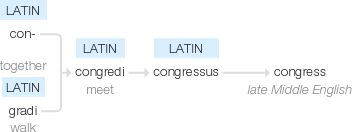Congress
late Middle English (denoting an encounter during battle): from Latin congressus, from congredi ‘meet’, from con- ‘together’ + gradi ‘walk’.
wiktionary
From Latin congressum, the past participle of congredior(“I go, come together”), itself from con- + gradior(“I go, step”). The verb is from the noun.
etymonline
congress (n.)
c. 1400, "a body of attendants; also "meeting of armed forces" (mid-15c.); sense of "a coming together of people, a meeting of individuals" is from 1520s; from Latin congressus "a friendly meeting; a hostile encounter," past participle of congredi "to meet with; to fight with," from assimilated form of com "with, together" (see con-) + gradi "to walk," from gradus "a step" (from PIE root *ghredh- "to walk, go").
Meaning "sexual union" is from 1580s. Specific sense of "a meeting of delegates, formal meeting of persons having a representational character" is first recorded 1670s. Used in reference to the national legislative body of the American states (with a capital C-) since 1775 (from 1765 in America as a name for proposed bodies).
The three sittings of the Continental Congress, representing the 13 rebellious American colonies, met 1774, 1775-6, and 1776-81. The Congress of the Confederation met from 1781-89, and the Congress of the United States met from March 4, 1789. The Congress of Vienna''''met Nov. 1, 1814, to June 8, 1815, and redrew the map of Europe with an eye to creating a balance of powers after the disruptions of Napoleon.
